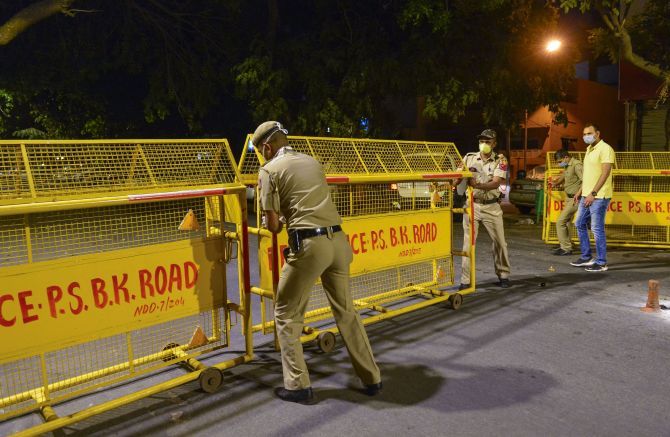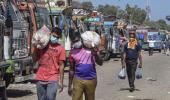Agriculture, construction, information technology and industrial units in the special economic zones and rural areas are among some sectors where the coronavirus-induced lockdown restrictions will be lifted with safeguards from April 20 in a bid to kickstart the country's battered economy and reduce the distress caused to millions of people.

As the second phase of the national lockdown came into force on Wednesday, the ministry of home affairs unveiled the ‘consolidated revised guidelines' relaxing the curbs with conditions.
The relaxations lay strict emphasis on social distancing with a warning by Union home secretary Ajay Bhalla that it will be withdrawn if there is any violation of the lockdown norms, as coronavirus cases in the country crossed 1,000 for the second consecutive day on Wednesday. The 40-day lockdown period ends on May 3.
The total number of COVID-19 infections crossed 12,000 while the death toll surpassed 400, according to official data.
As part of series of restrictions, spitting in public places has been prohibited and it will be a punishable offence with a fine under the Disaster Management Act.
Any violation may result in imprisonment of up to one year or a fine, or both.
Wearing of masks in public places has also been made compulsory and sale of liquor, gutka and tobacco totally banned.
The guidelines come a day after Prime Minister Narendra Modi announced the extension of the three-week nationwide lockdown for another 19 days till May 3 to battle the coronavirus pandemic.
He had also indicated conditional easing of some curbs after April 20 in areas which are not hotspots to allow some “select necessary activities”.
The permitted activities from April 20 are aimed at ensuring agricultural and related activities remain fully functional, rural economy functions with maximum efficiency, employment opportunities are created for daily wage earners and other members of labour force, select industrial activities are allowed to resume their operations, with safeguards and mandatory standard operating protocols and digital economy, the MHA said.
To ensure maximum containment of coronavirus during the lockdown period, the Union health ministry has asked states to classify districts into hotspots, non-hotspots and green zones.
The Centre has declared 170 hotspots -- 123 hotspot districts with large outbreaks and 47 hotspot districts with clusters -- in 25 states and Union territories.
Besides, it has identified 207 non-hotspot districts with clusters in 27 states.
Districts witnessing high number of cases or high growth rate of infections are being marked as hotspots; districts where some cases have been found as non-hotspots; and those which have reported no cases as green zones.
In a letter to all chief secretaries of states and UTs, Union health secretary Preeti Sudan said hotspot districts need to ensure implementation of the outbreak containment plan, adding the states also need to identify hotspots based on the doubling rate of confirmed cases.
The health ministry also maintained there has been no community transmission of the disease in the country so far.
"There is no community transmission in the country so far. What we are seeing is some local outbreaks and clusters, where cluster and outbreak containment strategies are being adopted," Lav Agarwal, joint secretary in the ministry of health, told the daily media briefing.
Cabinet Secretary Rajiv Gauba held a video conference with all chief secretaries, DGPs, health secretaries, collectors, SPs, municipal commissioners and CMOs where hotspots were discussed and orientation on field level implementation of containment strategy was given.
"They were told about large outbreak containment strategies, cluster containment strategies. Delineation of buffer and containment zone, parameter mapping, defining of entry and exit point were also discussed in detail," Agarwal said.
The death toll due to coronavirus rose to 392 with 39 fatalities reported since Tuesday evening, while the number of cases saw a jump of 1,118 to go up to 11,933 on Wednesday, according to the Union health ministry.
As many as 1,343 people were cured and discharged, and one has migrated, it said.
A single day highest increase of 1,463 cases was recorded on Tuesday.
Data obtained from the Indian Council of Medical Research (ICMR) said that till April 14 the number of samples tested stood at 2,44,893, an increase of 27,339 from the corresponding figure till the previous day (2,17,554).
Experts feel the figures are modest for a country of the size of 1.3 billion and "much more number of tests" are needed to combat the COVID-19 outbreak in the country.
"Given the massive size of our population, the number of tests needs to be ramped up and should be conducted more rigorously. We need to do effective contact tracing and test them so that those people in turn do not infect others," Dr Ravi Shekhar Jha, Senior Consultant and Head of the Department of Pulmonology at Fortis Escorts, Faridabad, said.
The MHA guidelines broadly listed activities allowed from April 20 and restrictions till May 3.
The exemptions given will not be applicable in COVID-19 hotspots/ containment zones and the State/UT governments shall not dilute guidelines in any manner but may impose stricter measures as per local requirements, according to the MHA.
All work places which have been allowed to function shall have adequate arrangements for temperature screening and providing sanitizers at convenient places.
India Inc backed the government's move to allow industrial units located in rural areas to function, and said it will ensure preventive measures for COVID-19 while restarting the economic activities.
“The guidelines will boost the country's economic growth in a slow but steady manner,” said Jaxay Shah, National Chairman of CREDAI, an apex body of private real estate developers associations.
Services provided by self-employed electrician, information technology repairs, plumbers, motor mechanics, carpenters will be allowed giving relief to people looking for such facilities.
Laying out the dos and don'ts, the guidelines stated that all work places should make adequate arrangements for temperature screening and must provide sanitisers at convenient places.
Educational institutions, coaching centres, domestic, international air travel, train services will remain suspended, the ministry said.
Public places such as cinema halls, malls, shopping complexes, gymnasiums, sports complexes, swimming pools and bars will be shut too till May 3.
All social, political, sports, religious functions, religious places, places of worship will also be closed till then, according to the guidelines.
However, highway 'dhaba' (eateries), truck repairing shops, call centres for government activities will remain open from April 20.
Both government and private industries and industrial establishments "operating in rural areas, i.e. outside the limits of municipal corporations and municipalities" will be allowed to operate, according to the guidelines.
Manufacturing, industrial units with access control in special economic zones, export oriented units, industrial estates, industrial townships will also be allowed.
Activities permitted five days from now include those related to agricultural and the horticultural sectors, farmers and farm workers in the field as well as procurement of agri products.
Shops selling agriculture machinery and those dealing with spare parts, supply chains and repairs as well as 'custom hiring centres' related to farm machinery will also be open from that day.
Units manufacturing drugs, pharmaceuticals, medical devices, medical infrastructure, including manufacture of ambulances, will also open.
Noting that digital economy is critical to services sector, the ministry said e-commerce operations, operations of IT and IT-enabled services(ITeS), data and call centres for Government activities, and online teaching and distance learning are all permitted. The IT and ITeS sector will be allowed to operate with up to 50 per cent strength.
The home ministry said permitted industries must make arrangements for stay of workers within their premises or adjacent buildings by observing social distancing norms.
The transportation of workers to workplace would also have to be arranged by the employers in dedicated transport by ensuring social distancing.
The guidelines also stated that grocery stores, fruits, vegetables shops/ carts, milk booths, poultry, meat and fish shop will remain open during the lockdown period.











 © 2025
© 2025